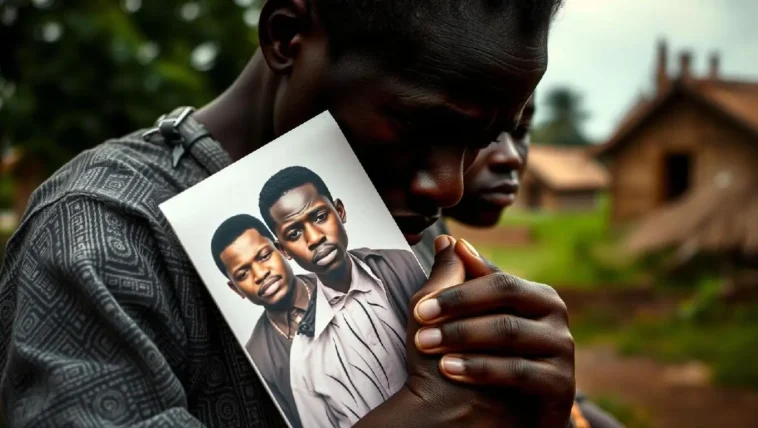Uromi Hunters Killing
Uromi Tragedy: 16 Hunters Killed in Edo State
Uromi Hunters Killing: A tragic incident highlights the urgent need for security reform in Edo State and the South-South region.Uromi Hunters’ Massacre: Vigilante Justice or Jungle Justice in Edo State?
The serenity of Uromi, a bustling town in Edo State, was shattered on March 27, 2025, when sixteen Fulani hunters met a gruesome end. Traveling from Kano to Rivers State for the joyous Eid celebrations, their journey was tragically cut short by a vigilante mob. What began as suspicion quickly spiraled into a bloodbath, raising critical questions about vigilante justice, ethnic tensions, and the state of security in Nigeria’s South-South region. Naija NewsBurrow Network investigates this shocking incident that has ignited a firestorm of debate across the nation.
A Pilgrimage of Peace Turned Deadly: The Hunters’ Ill-Fated Journey
Imagine the anticipation, the camaraderie, the shared excitement as these sixteen men embarked on their journey. They were hunters, yes, but also fathers, brothers, and sons, all eager to celebrate Eid with loved ones. Their route took them through Uromi, a town they likely knew little about, unaware of the simmering tensions that would seal their fate. What started as a simple journey soon became a nightmare, a stark reminder of the dangers that lurk in the shadows of Nigeria’s inter-state travel.
The hunters, armed with locally made dane guns, were en route to Rivers State, their intentions peaceful and celebratory. Little did they know that their presence, their ethnicity, and their firearms would trigger a deadly chain of events. The hunters may have been licensed to carry firearms in their home states, but this did not matter to the vigilantes in Uromi. The stage was set for a tragedy that would expose the fragility of peace in a nation grappling with deep-seated divisions.
The question remains: Could this tragedy have been averted? Were there missed opportunities for dialogue, for verification, for a more measured response? These are the questions that haunt the families of the victims and demand answers from those entrusted with maintaining law and order.
Udune Efandion: Where Mistrust Brewed and Violence Erupted
Udune Efandion, a seemingly unremarkable location, became the stage for a horrific drama. The vigilantes, acting on suspicion, intercepted the hunters’ truck, their apprehension fueled by the sight of the dane guns. In a nation plagued by kidnappings and banditry, such sights can quickly ignite fear and distrust. But what followed was not a careful investigation, but a descent into mob violence. The actions of the vigilantes were swift and brutal, a stark departure from the principles of justice and due process.
The vigilantes, emboldened by their numbers and driven by a sense of righteous indignation, took the law into their own hands. They accused the hunters of being kidnappers, a charge that was never substantiated. Instead, they subjected them to a brutal lynching, desecrating their bodies and setting their truck ablaze. The scene at Udune Efandion that day was one of unimaginable horror, a testament to the dangers of unchecked vigilantism and the erosion of trust in law enforcement.
The blood-soaked soil of Udune Efandion now serves as a grim reminder of the consequences of prejudice and the urgent need for a more just and equitable society.
Vigilante Justice: A Shield Against Crime or a Gateway to Anarchy?
In many Nigerian communities, vigilante groups have emerged as a response to the perceived ineffectiveness of the police. Often hailed as heroes for their efforts in combating crime, they operate in a gray area, often blurring the lines between law enforcement and extrajudicial violence. While some see them as a necessary evil, others view them as a threat to the rule of law.
The Uromi killings highlight the inherent dangers of vigilante justice. Without proper training, oversight, or accountability, these groups can easily become instruments of abuse, driven by prejudice, fear, or personal vendettas. The unchecked power of vigilantes can lead to a breakdown of law and order, creating a climate of fear and impunity.
The question is not whether vigilante groups should exist, but rather how they can be regulated and held accountable. A balance must be struck between empowering communities to protect themselves and ensuring that justice is administered fairly and impartially. The Uromi tragedy serves as a wake-up call, a stark reminder of the potential for vigilante justice to devolve into jungle justice.
Survivor’s Account: The Unheard Voice of Abubakar Shehu
Amidst the carnage, one voice emerged to tell the tale of horror. Abubakar Shehu, a hunter who miraculously escaped the massacre, recounted his ordeal with chilling detail. His story paints a picture of unprovoked brutality, a descent into mob violence fueled by suspicion and prejudice. Shehu’s account is a powerful indictment of the vigilantes’ actions and a stark reminder of the human cost of unchecked vigilantism.
Shehu’s testimony reveals a disturbing lack of due process. The vigilantes made no attempt to verify the hunters’ identities or their claims of being licensed firearm owners. Instead, they resorted to violence, driven by a pre-conceived notion that the hunters were criminals. Shehu’s escape was nothing short of miraculous, a testament to his resilience and a beacon of hope amidst the darkness.
His story is a call for justice, a plea for accountability, and a reminder that every life matters. Abubakar Shehu’s voice must be heard, not just as a survivor, but as a symbol of the urgent need for security sector reform and a more just society.
National Outrage: Tinubu’s Directive and the Quest for Justice
The Uromi killings sparked a wave of national outrage, prompting swift action from the highest levels of government. President Bola Ahmed Tinubu condemned the “jungle justice” and ordered a thorough investigation into the incident. His directive sent a clear message that such acts of violence would not be tolerated and that those responsible would be brought to justice.
Governor Monday Okpebholo of Edo State visited the families of the victims in Kano, offering condolences and pledging compensation. His visit was a gesture of solidarity, an attempt to bridge the divide between the two states and reassure the families that justice would be served. The governor’s actions were a step in the right direction, but much more needs to be done to address the root causes of the conflict and prevent future tragedies.
The federal government’s intervention and the state government’s response demonstrate a commitment to justice and accountability. However, the true test lies in the effectiveness of the investigation and the prosecution of the suspects. The families of the victims deserve nothing less than full justice, and the nation deserves assurance that such atrocities will never happen again.
The Tinderbox of Ethnic Tension: Herders, Farmers, and the Struggle for Survival
The Uromi killings cannot be viewed in isolation. They are a symptom of a deeper malaise, a reflection of the simmering ethnic tensions between northern herders and southern farmers. These tensions, often fueled by competition for land and resources, have led to countless clashes and a cycle of violence that threatens the fabric of Nigerian society.
The herder-farmer conflict is a complex issue with deep historical roots. Climate change, desertification, and population growth have exacerbated the competition for resources, leading to increased friction between the two groups. Misinformation, prejudice, and the proliferation of firearms have further fueled the conflict, creating a volatile mix that can easily explode into violence.
Addressing the herder-farmer conflict requires a multi-faceted approach that tackles the root causes of the problem. This includes promoting sustainable agriculture, providing alternative livelihoods for herders, strengthening law enforcement, and fostering dialogue and understanding between the two groups. Only through a concerted effort can Nigeria hope to break the cycle of violence and build a more peaceful and prosperous future for all.
Amnesty’s Plea: Echoes of Justice for the Silenced
In the wake of the Uromi tragedy, Amnesty International Nigeria issued a resounding call for justice. The organization condemned the “brutal lynching” and demanded a thorough, impartial investigation into the killings. Amnesty’s statement underscored the urgent need for accountability and the protection of human rights in Nigeria.
Amnesty International’s call is a reminder that justice must be blind, impartial, and swift. Those responsible for the Uromi killings must be held accountable, regardless of their ethnicity, social status, or political affiliation. The organization’s unwavering commitment to human rights serves as a beacon of hope for the victims and a challenge to those who seek to undermine the rule of law.
The Uromi killings must not be swept under the rug. They must be a catalyst for change, a turning point in Nigeria’s quest for a more just and equitable society. Amnesty International’s voice, along with the voices of countless others, must continue to echo until justice is served and the rights of all Nigerians are protected.
Seeking Justice: The Transfer of the Case to Abuja and the FCID
In a move signaling the gravity of the Uromi killings, the case was transferred to the Force Criminal Investigation Department (FCID) in Abuja. This decision underscores the federal government’s commitment to ensuring a thorough and impartial investigation. The FCID, with its specialized expertise and resources, is expected to bring the perpetrators to justice and shed light on the circumstances surrounding the tragedy.
The transfer of the case to Abuja also reflects a desire to remove the investigation from the local context, where ethnic tensions and political pressures could potentially influence the outcome. By entrusting the investigation to a federal body, the government aims to ensure that justice is administered fairly and without bias.
The FCID’s involvement is a welcome step, but it is only the beginning of a long and arduous process. The investigation must be thorough, transparent, and expeditious. The evidence must be carefully gathered and analyzed, and the suspects must be prosecuted to the full extent of the law. Only then can the families of the victims find closure and the nation begin to heal.
Beyond Condolences: Healing Wounds and Building Bridges
In the aftermath of the Uromi killings, there has been an outpouring of condolences and expressions of sympathy for the victims and their families. However, words alone are not enough. Concrete actions must be taken to heal the wounds, build bridges between communities, and prevent future tragedies.
The Edo State government’s pledge to compensate the victims’ families is a positive step, but the details of the compensation package must be clearly defined and promptly implemented. Beyond financial assistance, the families need emotional support, counseling, and access to justice. They need to know that their loved ones did not die in vain and that their suffering will not be forgotten.
Building bridges between communities requires a concerted effort to promote dialogue, understanding, and reconciliation. This includes organizing joint activities, fostering inter-ethnic cooperation, and addressing the root causes of conflict. Only through a sustained commitment to peace can Nigeria hope to overcome its divisions and build a more united and harmonious society.
Echoes of History: Vigilante Violence and the Cycle of Impunity
The Uromi killings are not an isolated incident. They are part of a disturbing pattern of vigilante violence that has plagued Nigeria for years. From the burning of suspected kidnappers to the lynching of petty thieves, vigilante groups have often taken the law into their own hands, dispensing their own brand of justice with brutal efficiency.
This cycle of impunity is fueled by a number of factors, including a lack of trust in law enforcement, a culture of violence, and a failure to hold perpetrators accountable. When people feel that the justice system is not working, they are more likely to resort to vigilante justice, creating a vicious cycle of violence and retribution.
Breaking this cycle requires a fundamental shift in attitudes and practices. Law enforcement must be strengthened, the justice system must be reformed, and perpetrators of vigilante violence must be brought to justice. Only then can Nigeria hope to create a society where the rule of law prevails and where every citizen is protected from violence and abuse.
Charting a New Course: Reimagining Security in Edo State and Beyond
The Uromi killings have exposed the urgent need for security sector reform in Edo State and beyond. The current system, characterized by weak policing, unchecked vigilantism, and a lack of community engagement, is clearly not working. A new approach is needed, one that prioritizes community policing, conflict resolution, and respect for human rights.
Community policing involves building trust between law enforcement and the communities they serve. This includes recruiting officers from local communities, providing them with specialized training, and empowering them to work in partnership with residents to identify and address security concerns. Community policing can help to prevent crime, reduce violence, and build a more cohesive and resilient society.
Conflict resolution mechanisms, such as mediation and dialogue, can help to address the root causes of conflict and prevent future violence. These mechanisms involve bringing together conflicting parties, facilitating communication, and helping them to find common ground. Conflict resolution can be particularly effective in addressing the herder-farmer conflict, where dialogue and understanding are essential to finding lasting solutions.
Respect for human rights must be at the center of any security sector reform. This includes ensuring that law enforcement officers are trained to respect the rights of all citizens, regardless of their ethnicity, religion, or social status. It also includes holding perpetrators of human rights abuses accountable and providing victims with access to justice and redress.
A Call to Action: Building a More Just and Peaceful Nigeria
The Uromi killings are a tragedy that should never have happened. They are a stark reminder of the challenges facing Nigeria and the urgent need for change. As a nation, we must learn from this tragedy and commit ourselves to building a more just, peaceful, and equitable society for all.
This requires a concerted effort from all stakeholders, including government, civil society, religious leaders, and ordinary citizens. We must strengthen law enforcement, reform the justice system, promote dialogue and understanding, and address the root causes of conflict. We must also hold ourselves accountable and challenge prejudice, discrimination, and violence in all its forms.
The Uromi hunters did not die in vain. Their deaths must serve as a catalyst for change, a turning point in Nigeria’s quest for a better future. Let us honor their memory by working together to build a nation where every citizen is protected from violence and abuse and where justice and peace prevail.
Join the conversation. Share your thoughts and opinions on the Uromi killings and the way forward for Nigeria. Together, we can make a difference.
As we grapple with the aftermath of the Uromi tragedy, it’s impossible to ignore the broader context of insecurity that plagues many Nigerian communities. The need for safety and security has never been more pressing, and individuals are increasingly seeking proactive measures to protect themselves and their loved ones. While justice for the Uromi victims remains paramount, the incident has also sparked a nationwide conversation about personal security and the steps we can take to safeguard our homes and communities.
In a world where threats can emerge unexpectedly, vigilance and preparedness are key. From enhancing home security to staying informed about local events, there are numerous ways to take control of your safety. As part of our commitment to providing comprehensive coverage, Naija NewsBurrow Network is dedicated to helping you explore practical solutions that can make a real difference in protecting what matters most. Join us as we delve into a range of options designed to empower you and enhance your peace of mind. And, don’t forget to share your thoughts and experiences in the comments below – your insights can help others navigate these challenging times. Subscribe to our newsletter for the latest updates and expert advice on staying safe and secure.
Shop Products On Amazon
Shop Products on Ebay









Trending Similar Stories in the News
Uromi Killings: Ban movements of hunters from North to South – Reps member, Rirum MSN...
Uromi killings: Survivor narrate how e escape as victims families demand justice BBC...
Trending Videos of Uromi Hunters Killing
Nigeria Violence: Governor's Office Revises Previous Toll Of 17 In Benue State | WION
Similar Popular Articles
#NigeriaSecurity #EdoState #VigilanteJustice #EthnicConflict #HunterKillings
Uromi, Edo State, Hunters, Killing, Violence






💬 What’s your take? Drop a comment below! ⬇️
#BreakingNews #LatestUpdate #StayInformed
📖 Read More: https://honeydew-zebra-306959.hostingersite.com/uromi-hunters-killing-edo-state/
Uromi Tragedy: 16 Hunters Killed in Edo State
💬 What’s your take? Drop a comment below! ⬇️
#BreakingNews #LatestUpdate #StayInformed
📖 Read More: https://tinyurl.com/ytmfu3k9